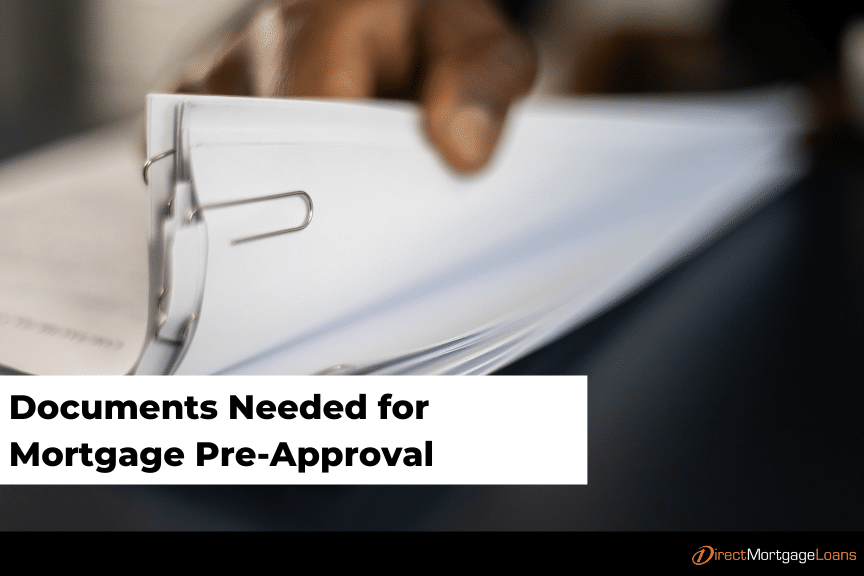Securing a mortgage preapproval is a crucial step in the homebuying process. It’s essentially a financial health check to determine your loan eligibility and affordability. To determine your eligibility, lenders need specific financial information. This guide will walk you through the documents you’ll need to provide, from the standard documents required, to documents needed for more complex situations like self-employment or retirement income. Let’s dive in!
Subscribe to our blog to receive notifications of posts that interest you!
Documents Needed For A Mortgage Loan Preapproval
The mortgage preapproval process involves a lender assessing your financial health to determine your loan eligibility and affordability. To complete this evaluation, you’ll need to provide documentation verifying your income, assets, debts, and credit history.
Mandatory for Everyone
To apply for mortgage preapproval, you’ll need to provide the following financial documents:
Identification
- To verify your identity, provide a valid government-issued ID, such as a driver’s license, passport, or social security card.
Income Verification
When applying for a mortgage, lenders need to verify your income to determine your eligibility and assess your repayment capability. To do this, you’ll need to provide the following documents:
- Federal Tax Returns: Provide your federal tax returns from the past two years. These show your income, deductions, and tax liabilities, helping lenders evaluate your earning potential.
- W2s and 1099s: Submit copies of all W-2s and 1099s received in the last two years. These forms detail your employment income and additional earnings from freelance or contract work.
- Paystub: Provide recent paystubs from the past 30 days. These verify your current employment status, income level, and any recent changes in earnings.
Asset Verification
To evaluate your financial stability, lenders will require documentation of your assets.
- Asset Statements: Provide detailed statements for all your asset accounts from the past two months, including checking, savings, investment, and retirement accounts. These statements show your financial stability and available funds for a down payment and closing costs.
Monthly Debts
Lenders consider your debt-to-income ratio (DTI) when reviewing your mortgage application. To calculate your DTI, you’ll need to provide a list of your fixed debts, which typically includes:
- Current Mortgage: If you own a home, include your monthly housing payment, covering both principal and interest.
- Home Insurance: Provide the cost of insuring your home against damage from fire, theft, and other covered risks if applicable.
- Personal Loans: List the monthly payments for any personal loans, such as car payments.
- Student Loans: Include the monthly payments for your federal and private student loans.
- Credit Cards: Record the minimum monthly payment required as per your credit card statements.
For Self-Employed Applicants
If you are self-employed, your income will be analyzed differently. Here are the documents needed:
- Business Tax Returns: All pages of your business tax returns for the past two years are necessary to assess business income and expenses.
- Profit and Loss Statements: If you maintain separate profit and loss statements, provide these as well. They offer additional insights into your business’s financial performance.
For Retirement Income
Some additional items will need to be provided if you have retirement income.
- Social Security Award Letter: A copy of the current year’s Social Security award letter is required to verify your monthly benefit amount.
- 1099s for Social Security: Provide your 1099s for Social Security for the past two years to document your income from Social Security benefits.
If You Have Child Support/ Alimony Income
Individuals receiving child support or alimony must submit the following:
- Divorce Decree/ Child Support Order: A copy of the divorce decree and child support order is necessary to verify the legal arrangement.
- Child Support Deposit: Bank statements demonstrating a consistent history of child support or alimony deposits over the past year are required to confirm income.
FAQs About Loan Preapprovals
Why do you need a preapproval?
A mortgage pre approval is crucial for homebuyers as it provides a clear picture of your purchasing power, preventing you from falling in love with a home you can’t afford. Additionally, a preapproval letter is a powerful tool when making an offer. It demonstrates financial capability to sellers, significantly increasing your chances of a successful purchase, especially in competitive markets.
How long does it take to get a preapproval letter?
The time it takes to get a preapproval letter can vary depending on the lender and the complexity of your financial situation. While pre-qualification could be obtained in minutes, preapproval typically requires a more thorough review of your finances, including a credit check and verification of income and assets. Typically, you can expect to receive a preapproval letter in a few days.
How long are preapprovals good for?
A mortgage preapproval usually lasts between 60 to 90 days. The exact timeframe depends on the expiration dates of the financial documents used in your mortgage application, such as credit reports and income verification.
What happens if my mortgage preapproval expires?
If your mortgage preapproval expires, you will need to apply for a new one. This means you will have to go through the application process again, provide updated financial information, and allow the lender to re-evaluate your eligibility for a loan.
Does a mortgage preapproval affect credit score?
Obtaining a mortgage preapproval can temporarily impact your credit score. This is because lenders typically perform a hard credit inquiry to verify your financial information. While a hard inquiry can cause a slight, short-term decrease in your credit score, the effect is generally minimal.
How do I get a mortgage preapproval?
To obtain preapproval, there are some simple steps you can take, including:
- Find a Lender: Work with a trusted Loan Officer who will discuss your homebuying plans and explore available loan options.
- Gather Necessary Documents: Prepare income verification (pay stubs, W-2s), tax returns, bank statements, and information about debts and assets.
- Complete the Pre Approval Application: Submit a mortgage application and provide your financial documents to your lender.
- Undergo Credit Check and Documentation Verification: The lender will pull your credit report and verify the information you provided.
- Receive Preapproval Letter: If approved, you’ll receive a letter stating the loan amount you qualify for.
Preapproval based on credit history, debt to income ratio, income, employment, and down payment. Approval is subject to eligibility.






